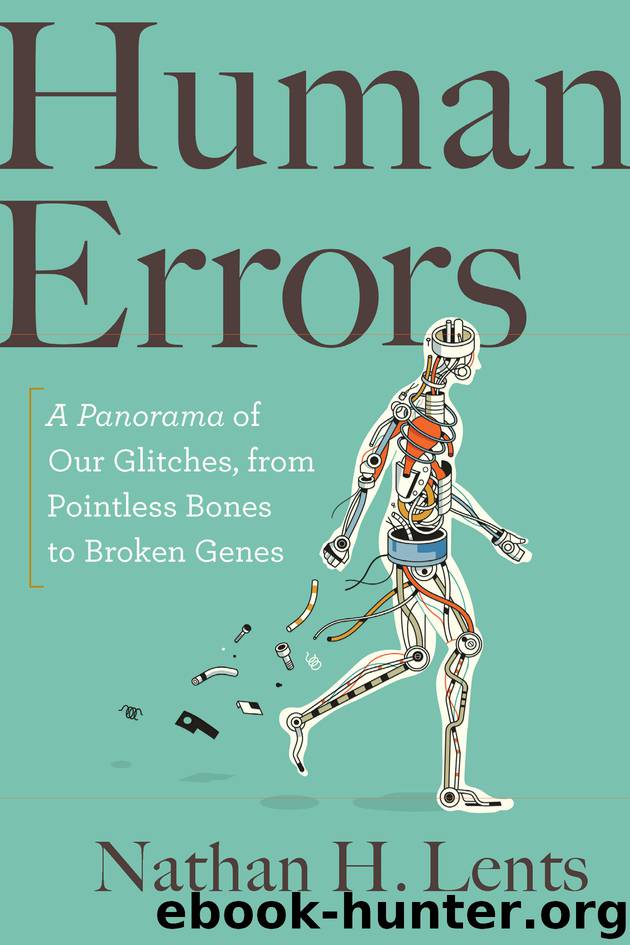Human Errors by Nathan H. Lents

Author:Nathan H. Lents
Language: eng
Format: epub, mobi
Publisher: Houghton Mifflin Harcourt
Coda: The Grandmother Hypothesis
Recently, it was discovered that two species of whales, orcas and pilot whales, undergo menopause. One study found an orca that had died at the ripe old age of 105, more than forty years after she had last reproduced. So while reproduction in humans is uniquely inefficient and often uniquely deadly in many respects, when it comes to menopause, at least, we are not entirely alone.
Also called reproductive senescence, menopause is the stage of a woman’s life in which she ceases to have menstrual cycles and is no longer capable of reproducing. And while some whales seem to experience it, most female mammals go on reproducing through old age, right up until the end. The cessation of reproduction by a female, even late in her life, would seem to reduce her chances of passing on her genetic legacy, so menopause is contradictory to the way natural selection usually works. It is a conundrum that requires an explanation, yet another possible flaw in our species’ reproductive capacity. However, since evolution did leave us with menopause, it might somehow be advantageous to an older woman—or her offspring—that she stop reproducing later in life. But how?
One idea is that when older women are relieved of the burden of reproducing, they begin to more actively invest in their children and their children’s children, and in so doing, they enhance the success of their genetic legacy to a greater degree than they would by simply making more children. But before we explore that possibility, we need to say a word about how menopause actually happens in women.
I once heard the folk wisdom that menopause is nothing more than a peculiar byproduct of the recently extended lifespan of humans, the idea being that, since life expectancy in the premodern era was only thirty or forty years, women usually didn’t live long enough to become menopausal. Only now that humans are routinely living into the seventh, eighth, and ninth decades has menopause begun to occur.
This idea is predicated on a misunderstanding of what life expectancy really means. While it is true that the average lifespan in the medieval, classical, and even prehistoric periods was just twenty or thirty years, the average age of death was low because so many died as infants or as children. Most people born during prehistory thus didn’t make it to reproductive age at all, but many of those who did enjoyed a fairly long life, even by today’s standards. We know from ancient texts and recovered skeletons that humans as old as seventy or eighty were not unheard of, even in the prehistoric period. It has been estimated that the average age of death for those who made it past adolescence was somewhere in the late fifties, with lots of people living into their sixties and a few into their seventies.
When it comes to middle age, modern medicine has really added only a decade and a half or so to the end of the human lifespan. The bigger difference
Download
This site does not store any files on its server. We only index and link to content provided by other sites. Please contact the content providers to delete copyright contents if any and email us, we'll remove relevant links or contents immediately.
Sapiens: A Brief History of Humankind by Yuval Noah Harari(14389)
Sapiens by Yuval Noah Harari(5369)
Pale Blue Dot by Carl Sagan(5007)
Homo Deus: A Brief History of Tomorrow by Yuval Noah Harari(4918)
Livewired by David Eagleman(3772)
Origin Story: A Big History of Everything by David Christian(3692)
Brief Answers to the Big Questions by Stephen Hawking(3435)
Inferior by Angela Saini(3312)
Origin Story by David Christian(3201)
Signature in the Cell: DNA and the Evidence for Intelligent Design by Stephen C. Meyer(3138)
The Gene: An Intimate History by Siddhartha Mukherjee(3098)
The Evolution of Beauty by Richard O. Prum(2996)
Aliens by Jim Al-Khalili(2829)
How The Mind Works by Steven Pinker(2816)
A Short History of Nearly Everything by Bryson Bill(2698)
Sex at Dawn: The Prehistoric Origins of Modern Sexuality by Ryan Christopher(2529)
From Bacteria to Bach and Back by Daniel C. Dennett(2484)
Endless Forms Most Beautiful by Sean B. Carroll(2482)
Who We Are and How We Got Here by David Reich(2437)
